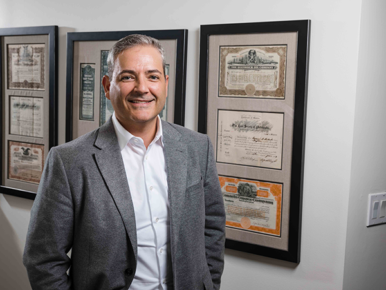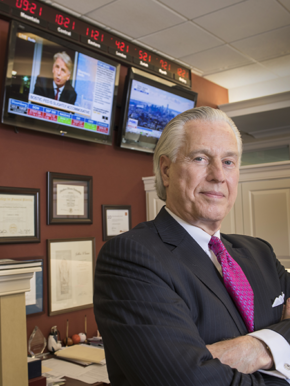Stormy weather ahead?
Wealth managers offer advice for navigating the next downturn
Stormy weather ahead?
Wealth managers offer advice for navigating the next downturn
Inverted yield curve. Unemployment. Consumer confidence. Interest rates. Inflation. Wealth managers are watching to see which way the economic indicator dominoes fall.
Michael Joyce, president of Richmond-based financial planning firm Agili, sees troubling signs of a slowing economy. “If business investment further declines, that could lead to unemployment. That could put a dent in consumer confidence.” And he’s especially concerned about the economic effects of the Trump administration’s ongoing trade war with China: “Tariffs are a very blunt instrument.”
During the past few years, though, Joyce says, “people have been investing based on a reading of tea leaves on what’s going on in Washington.” Election results and impeachment hearings can have a short-term effect on markets, but “things that go on in Washington have less impact than people think.”
Some economic indicators — such as a tame inflation rate and low unemployment — may lull people into not preparing for another recession, says Roberta Keller, CEO/founder of Alexis Advisors in Richmond.
Two in five Americans (40%) said they wouldn’t be ready for an economic downturn if it were to occur within the next six to 12 months, according to Bankrate’s October Financial Security Poll. Nearly a quarter of respondents (24%) to the consumer financial services company’s survey said they’re not very prepared, while 16% are not prepared at all.
“Consumers often don’t think about recession until they are in it,” Keller says. “Consumers aren’t yet feeling the effects. But as a money manager, I am definitely seeing signs of recession.”
The money managers for hundreds of the world’s wealthiest families agreed with that sentiment in a September survey by investment bank and financial services company UBS. Fifty-five percent of 360 firms surveyed said they see a recession beginning by the start of 2020. Forty-five percent said they were adjusting their portfolios, including shifting to bonds and real estate, while 42% said they were increasing cash reserves.
Going through the rapids

When another recession comes, “grip onto the sides of the kayak and go through the rapids,” advises Christopher Krell, a principal with Cassaday & Co. in McLean. “No recession has ever not been followed by recovery.”
The key is not allowing fear and anxiety to drive financial decisions, Krell says, because there are “all kinds of things you can do instead of sitting around and feeling sorry for yourself.” Make sure your personal finances are in order and that you have emergency funds in case you lose your job. Consider getting a side job. Look for opportunities such as taking advantage of low interest rates to refinance debts. Keep as diversified a portfolio as possible.
As Cal Brown, a financial adviser with Savant Capital in McLean, puts it: “Panic is not an investment strategy.” He cautions against market timing, a strategy of making your buying or selling decisions based on attempts to predict future market price movements.
“Once we are in a bear market, it is too late to sell stocks. You don’t want to sell when prices are already down. Everyone should assess their asset allocation now and be positioned to get through the recession OK,” says Brown, the author of “When Life Strikes: Weathering Financial Storms.”
Joyce also warns against trying to time the market; focus instead on long-term goals and objectives. “We’re in a pretty mature cycle now. This is a good time to be less aggressive than you might have been two, three, four, five years ago. Prune some positions that are pretty fully valued now; look for higher quality investments.”
People are taking some steps to prepare themselves for the next economic downturn, according to the Bankrate survey. Forty-four percent of respondents said they were spending less money; 33% were saving more for emergencies; and 31% were paying down credit card debt.
“Saving more for emergencies and paying down credit card debt are especially important steps to be taking, as fewer than one in five households has sufficient emergency savings, and the average credit card rate is over 17%,” Greg McBride, Bankrate’s chief financial analyst, said in a statement.
Gold, real estate, bitcoins, oh my!
Investing savings can be complicated, however.
Financial advisers used to talk just about investing in stocks and bonds, notes Daniel B. Ludwin, president and founding partner of Salomon & Ludwin in Richmond. “Now the most important allocation is what you have in stocks and what you don’t have in stocks. Now more than ever you need to distinguish between risk assets and non-risk assets.”
To counter the risks associated with stocks, many wealth managers recommend investing in alternative investments such as real estate and commodities, as well as bonds. “They don’t move in the same direction as stocks. You’re diversified — if something drops over here, something goes up there,” Brown says.
Ludwin, on the other hand, says “real estate and commodities are risk assets to us.” He recommends “ultra-short-term bonds right now. They’re not exciting, but you need patience. Some people are trying to find extra yield, but that’s a mistake.”
But Brown says he has found Real Estate Investment Trusts, or REITs, an alternative to owning real estate directly, to be “the best performer in our portfolio. People like them because they are liquid. They’re a great diversifier away from stocks.”
Gold is an old investment standby. “I would not go whole hog into gold,” Brown warns. “But it is in the commodities category. I would have commodities. You could buy a fund — precious metals, energy, agriculture. These are noncorrelated with the stock market, which is a good thing. They don’t move in lockstep with stocks.”
What about investing in cryptocurrencies such as Bitcoin? “Most of what I’ve seen going on hasn’t had anything to do with fundamentals; it has to do with speculation,” Joyce says. One of Agili’s clients put money into Bitcoin against the firm’s advice, and “she lost all of it in a pretty quick period of time. We do not recommend it.”
The key question is how much you put into these different categories, Brown says, noting that Savant Capital relies on “a scientific way to optimize based on Modern Portfolio Theory,” which uses a mathematical framework for assembling a portfolio.
This balancing “is not just for the coming recession. It should be a port you can live in and be comfortable with for the rest of your life,” Brown adds. “You have to take into account emotional factors. Some people can say, ‘I’ll just wait it out and be fine.’ Others will lose sleep at night.”
Like the Great Recession?
Joyce doesn’t expect the next recession to look like the financial crisis 10 years ago. “When we have the next bear market,” he says, “I believe it will be more the traditional type” than the sharp global economic downturn of 2008-09.

But the Great Recession provides good lessons for getting through the next downturn, according to Joseph W. Montgomery, managing director — investments for The Optimal Service Group of Wells Fargo Advisors in Williamsburg.
“You need to have patience, but with a little perspective, most of us can weather it,” Montgomery says. “In the 1987 tech bubble, in 2008 and 2009, in most cases, if people were reasonably well-diversified, they were in pretty good shape within 18-24 months. … Diversification matters. You need to re-balance or prune your portfolio as risks come along.”
Keller stresses the need for consumers to be educated about how to invest all through the economic cycle — expansion, peak, contraction and trough.
“I can help families be a tortoise rather than a hare.”
a















